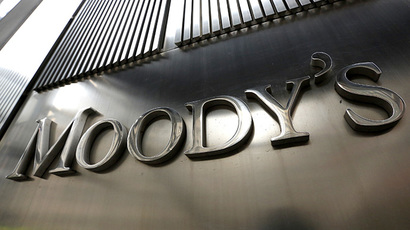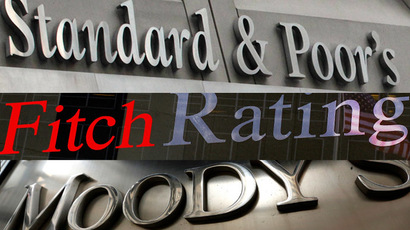Russia says Moody’s downgrades won’t hit economy

Economists in Russia say Moody’s rating cuts were largely expected and won’t have a dramatic effect on the economy, as its solvency remains strong and the debt to GDP ratio is many times lower than in most of the other major world economies.
Moody’s has been taking a pretty aggressive stance towards Russia and its state–owned firms over the past week. Recently the ratings agency downgraded Moscow and the so-called ‘northern capital’ St. Petersburg as well as such well-known Russian companies as Rosneft and Russian Railways. The country’s key lenders Sberbank, VTB, Gazprombank and Rosselkhozbank (Russian Agricultural Bank) were also downgraded.
These firms have seen their ratings cut to the second lowest investment grade (Baa2), with the outlook remaining negative. Their downgrade follows Saturday’s cut in Russian sovereign debt rating over solvency fears and doubts about future growth perspectives amidst sanctions and Ukraine crisis. Moody’s was the last rating agency among the world’s top three to downgrade sovereign debt.
However, experts in Russia say the downgrades won’t hit the economy, as it was largely anticipated.
“Current Moody's estimates are now more like those of colleagues from the Big Three. In this regard, the decision was predictable and is not able to have a negative impact on the economy. The only way it can worsen the situation is provoking a decline in the prices of some instruments in foreign markets, which have lost their investment-grade ratings,” Aleksandr Ovchinnikov, head of analytical department at Russia’s rating agency RusRating told RT.
Ovchinnikov said that Russia’s fundamentals are pretty sound, with the debt to GDP ratio at 11 percent, much lower than in many developed countries that also have huge balance of payments deficits.
“In terms of the size of the economy Russia also differs a lot from the number of other countries with the similar and even higher ratings,” he said.
Russia’s current account surplus, its strong currency reserves – around $480 billion – and $90 billion in the National Reserve Fund are more evidence the country’s solvency is pretty healthy.
In terms of the banks downgraded, Moody’s move will not have a serious impact on their businesses as the ratings are primarily important for external credit that is no longer available to Russian players due to sanctions.
"Despite the economic slowdown, Sberbank continues to show strong financial results and improve operational efficiency of the business ... The experience of previous crises shows the bank’s high persistence in an environment of macroeconomic instability,” the country's largest lender said in a statement.
Grand Capital analyst Yury Prokudin believes that a downgrade may be the result of capital outflow, but there is no need to worry.
"Credit agencies regularly lower the ratings of different countries. In the first half of this year, there was an outflow of foreign capital from Russia and, therefore, the rating was changed to negative. Moreover, in late March, another agency changed the credit rating to negative. In their opinion, the investment climate in Russia has somewhat deteriorated comparing to the previous year. There’s no panic. It really happens regularly," said Prokudin in an interview with the Regnum news agency.














